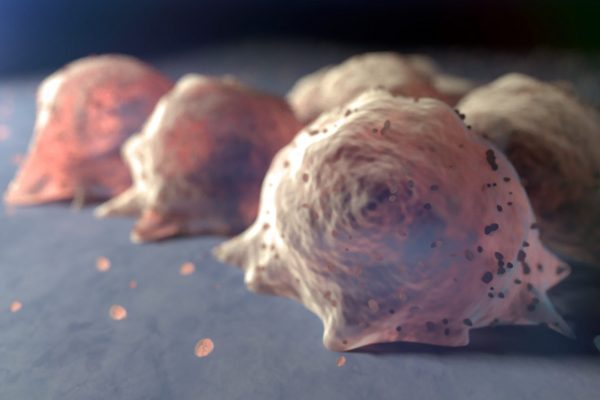
Acute graft-versus-host disease (aGvHD) is a life-threatening complication typically occurring within 100 days after an allogeneic haematopoietic cell transplantation (allo-HCT). The results of a hypothesis-generating phase 2 study, recently published in Haematologica, suggest that adding defibrotide to standard of care prophylaxis may further reduce the risk for aGvHD after an allo-HCT. Further studies with a larger sample size are necessary to confirm these findings.
Graft-versus-host disease (GvHD) is a life-threatening complication that can occur after an allogeneic haematopoietic cell transplantation (allo-HCT). It occurs when donor T cells recognise major or minor histocompatibility mismatches or gene polymorphisms from the recipient, leading to a cytotoxic effect on healthy tissues and organs. Acute GvHD (aGvHD) typically occurs within the first 100 days after allo-HCT. The current standard of care (SOC) for prophylaxis of aGvHD suppresses the immune system to overcome the immune response from donor T-cell recognition that induces aGvHD. However, this also increases the risk of opportunistic infection and disease relapse. Defibrotide, a polydisperse mixture of predominantly single-stranded polydeoxyribonucleotide sodium salts, could potentially reduce the incidence of aGvHD without an increase in opportunistic infections and relapse. This hypothesis-generating phase 2 study evaluated the efficacy of adding defibrotide to SOC GvHD prophylaxis to prevent aGvHD post-transplant.
This phase 2 study enrolled patients with acute leukaemia or myelodysplastic syndrome who underwent myeloablative or reduced-intensity conditioning, and were scheduled to receive an allo-HCT. Patients were randomly assigned (1:1) to receive SOC plus defibrotide (n=79) or SOC alone (n=73). In both groups, 74% of patients received GvHD prophylaxis with methotrexate-based regimens and 30% with antithymocyte globulin (ATG). The primary endpoint consisted of the cumulative incidence of grade B-D aGvHD at day 100 post-transplant. Overall survival (OS) was an exploratory endpoint at day 180 post-transplant. Of note, this study was designed for hypothesis-generating and was not powered to detect minimal clinically meaningful differences between treatment arms at a significant level of 5%.
The primary endpoint analysis revealed that the cumulative incidence of grade B-D aGvHD at day 100 post-transplant was numerically lower in the defibrotide prophylaxis arm (38.4%) compared to the SOC arm (47.1%) (difference: -8.8%, 90%CI: -22.5-4.9). This difference at day 100 was more pronounced in a subgroup of patients who received ATG (30.4% vs. 47.6% in the defibrotide and SOC arms, respectively; difference: -17.2%, 90%CI: -41.8-7.5). OS rates at day 180 post-transplant were similar between arms (86.0% vs. 86.9% in the defibrotide and SOC arms, respectively), as were the rates of serious treatment-emergent adverse events (42% vs. 44%).
While not conclusive, the results of this study suggest that adding defibrotide to SOC prophylaxis may help prevent aGvHD after allo-HCT. Further studies with larger sample sizes are necessary to confirm these findings and determine which patient subgroup might derive the most clinical benefit.
Reference